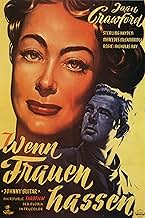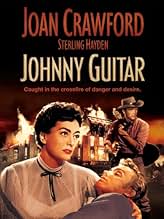NOTE IMDb
7,6/10
20 k
MA NOTE
Après avoir aidé le membre d'un gang blessé, la propriétaire au fort caractère d'un saloon est accusée à tort de meurtre et de braquage de banque.Après avoir aidé le membre d'un gang blessé, la propriétaire au fort caractère d'un saloon est accusée à tort de meurtre et de braquage de banque.Après avoir aidé le membre d'un gang blessé, la propriétaire au fort caractère d'un saloon est accusée à tort de meurtre et de braquage de banque.
- Récompenses
- 1 victoire et 1 nomination au total
Trevor Bardette
- Jenks
- (non crédité)
George Bell
- Posseman
- (non crédité)
Bob Burrows
- Posseman
- (non crédité)
Curley Gibson
- Posseman
- (non crédité)
Chick Hannan
- Posseman
- (non crédité)
Histoire
Le saviez-vous
- AnecdotesAt one point, Johnny says, "I'm a stranger here myself." This was Nicholas Ray's own personal motto, a recurring theme in his movies, and reportedly the working title for just about every movie he directed.
- GaffesAfter the bank robbery, Vienna and Johnny Guitar are riding along in a buggy drawn by a single horse. While the horse sounds like it is only trotting along, the scenery rushing past the buggy makes it appear the buggy is going at highway speed.
- ConnexionsEdited into Bonanza: The Night Virginia City Died (1970)
Commentaire à la une
Boy this is a jewel, and for many different reasons. A good lot of people deserve credit for their work
First is Nicholas Ray for his direction. A fine preparation and presentation of the visual elements really took some doing. The use, but not excessive glorification (thank goodness), of the relatively new Trucolor is well-done; the horses full of black-clad riders rushing up the rocky hill in the night, the many shots of the furious blazes dissolving Vienna's place, and so much more.
The acting is remarkable. Sterling Heyden, just in standing before the camera and delivering his lines in that firm and fearless manner (ala Asphalt Jungle), is a strong presence. John Carradine once again shows himself as the precious dramatist he proved himself to be many years before in The Grapes of Wrath.
What strikes me the most, though, is Ben Maddow's (thank Phillip Yordan for being an heroic front) screenplay. It is not only thick in theme and symbolism, it is thick with what was (at the time) almost unprecedented elements. Both Vienna and Emma are, as either GOOD or BAD, shown as the leaders of men! Pacifism is being shown as a good thing! Is that the good guys wearing black and the bad guys wearing white (or maybe the other way around)?! As many comments have mentioned, the Un-American Activities Committee parallels (complete with the entire Ox-Bow-esquire element) are, really, quite thinly veiled. The economically powerful, Small and McIver, are dominant and monopolistic capitalists (a version of antagonism almost unseen, for obvious reasons, since the McCarthey-assaulted Force of Evil). Remember, this is 1954!!!! This stuff is downright revolutionary! How did they ever get it all past the censors and masters of the code?
Let's hope time doesn't forget this one in favor of some formulaic shoot-'em-ups simply because they feature "the Duke."
First is Nicholas Ray for his direction. A fine preparation and presentation of the visual elements really took some doing. The use, but not excessive glorification (thank goodness), of the relatively new Trucolor is well-done; the horses full of black-clad riders rushing up the rocky hill in the night, the many shots of the furious blazes dissolving Vienna's place, and so much more.
The acting is remarkable. Sterling Heyden, just in standing before the camera and delivering his lines in that firm and fearless manner (ala Asphalt Jungle), is a strong presence. John Carradine once again shows himself as the precious dramatist he proved himself to be many years before in The Grapes of Wrath.
What strikes me the most, though, is Ben Maddow's (thank Phillip Yordan for being an heroic front) screenplay. It is not only thick in theme and symbolism, it is thick with what was (at the time) almost unprecedented elements. Both Vienna and Emma are, as either GOOD or BAD, shown as the leaders of men! Pacifism is being shown as a good thing! Is that the good guys wearing black and the bad guys wearing white (or maybe the other way around)?! As many comments have mentioned, the Un-American Activities Committee parallels (complete with the entire Ox-Bow-esquire element) are, really, quite thinly veiled. The economically powerful, Small and McIver, are dominant and monopolistic capitalists (a version of antagonism almost unseen, for obvious reasons, since the McCarthey-assaulted Force of Evil). Remember, this is 1954!!!! This stuff is downright revolutionary! How did they ever get it all past the censors and masters of the code?
Let's hope time doesn't forget this one in favor of some formulaic shoot-'em-ups simply because they feature "the Duke."
Meilleurs choix
Connectez-vous pour évaluer et suivre la liste de favoris afin de recevoir des recommandations personnalisées
- How long is Johnny Guitar?Alimenté par Alexa
Détails
Box-office
- Montant brut mondial
- 6 875 $US
- Durée1 heure 50 minutes
- Couleur
Contribuer à cette page
Suggérer une modification ou ajouter du contenu manquant

Lacune principale
By what name was Johnny Guitare (1954) officially released in India in English?
Répondre





































